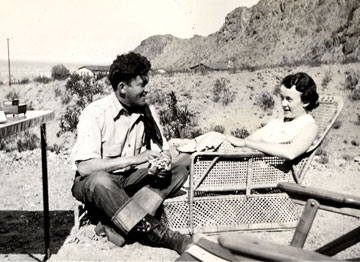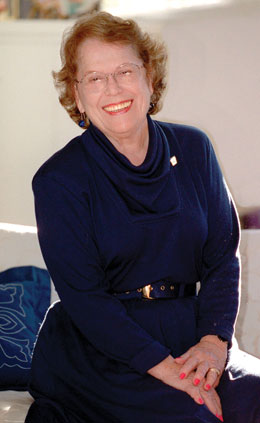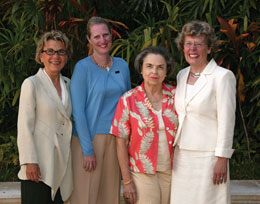Volume 26 · Number 1 · Fall 2008
Giving
A History of Giving

Harrison Collection: Over the course of their lives together, Michael and Margaret Harrison assembled a priceless collection of Western Americana that is of great value to scholars and aficionados. UC Davis assisted Michael Harrison in managing the collection of books, maps, art and other artifacts, and Harrison passed the collection to the University Library when he died in 2005. This photo is of the Harrisons near Santa Fe, 1932. (Photo: UC Davis Special Collections)
Since UC Davis’ founding, philanthropic support has proved vital to successfully fulfilling its mission of teaching, research and public service.
Making his way through the rubble of the 1906 San Francisco earthquake, George W. Pierce Jr. was a man on a mission. He carried the legal paperwork to bring the long-awaited University Farm to life. The Central Valley’s first UC alum, Pierce had already rallied Davisville Chamber of Commerce members to donate $4,517.50—about $100,000 in today’s dollars—to purchase the water rights for the 730-acre site selected by the state. Without the extra effort by Pierce and friends, UC Davis might never have set roots.
This personal dedication and support in the early days of UC Davis set a precedent for philanthropy that continues today. Throughout the past century, hundreds of thousands of donors have contributed to UC Davis’ wide range of schools, colleges and programs.
Today, the university receives over 45,000 gifts and pledges annually from individuals, foundations, corporations and other organizations. Thanks to this generosity, UC Davis has been able to provide student scholarships and faculty support, increase its public service, build new facilities and improve existing ones, and fund cutting-edge research that benefits our global community.
“UC Davis is deeply grateful to each donor,” said Chancellor Larry Vanderhoef. “The history of UC Davis is, in many ways, intertwined with the history of its philanthropists. Each gift is an inspirational story, and I wish we could tell each one, because all our donors inspire us. Surely, as we celebrate UC Davis, we also honor all of those whose gifts have supported the university’s achievements.”
Setting a Precedent for Philanthropy
Peter J. Shields, the dedicated champion for the University Farm, saw early opportunities for philanthropy on campus. He and his wife, Carolee, established the first endowed scholarship fund in 1938 with a gift of $7,500. Upon Carolee’s death in 1972, her bequest went toward scholarships and arboretum improvements.
Since the Shields’ initial gift, thousands of students have benefited from scholarships established through private giving to UC Davis. Individuals such as Theodora Peigh have carried on the tradition. In the largest gift that UC Davis has received exclusively for financial aid, Peigh’s estate has provided more than $13 million directed for veterinary students. Hundreds of students have benefited from her foresight and generosity.
Student support became a campuswide focus in the 1990s, when the UC Davis community responded to its first dramatic rise in fees. Alumni, donors, faculty, staff and students rallied to raise more than $16.5 million for scholarship support through the Students First campaign.
Mid-century Legacies

Barbara Jackson and her late husband, former UC Davis history professor W. Turrentine Jackson, have made numerous gifts to the university. Barbara K. and W. Turrentine Jackson Hall in the Mondavi Center is named after the couple in gratitude for her gift to the center. (Photo: Neil Michel/Axiom)
In the late 1940s, California rancher Fred Bixby saw the need for agricultural students to have access to practical farm experiences. So in 1948, Bixby made a seminal gift to establish the Bixby Work-Learn Program, which connected students to internships and hands-on learning opportunities. As the campus expanded, the Bixby program also grew, benefiting many more students.
One of the earliest campaigns for private support occurred in the 1950s when the campus community united to raise $1 million in gift support to construct the Student Memorial Union. The initial one-story building was originally dedicated in 1955 in honor of the 128 UC Davis students and alumni lost in military service from World War I through WWII. It remains a vital hub for campus life as well as a place that memorializes all Aggies killed in military service.
Alumni and friends pitched in for another community-use building in the 1970s, when the campus recognized a need for a new recreation hall. Completed in 1977, the “Rec Hall” is now part of the new Activities and Recreation Center, or ARC, which was completed in 2004 and was funded primarily by students, with donor and other support.
The building that has served as a “front door” for the campus since 1992, the Walter A. Buehler Alumni and Visitors Center, also benefitted from a community-spirited fundraising campaign. The center was built in large part through nearly $5 million in private giving by alumni and other donors, including a $1 million donation from UC Davis friend and lecturer Walter D. Buehler and his late wife, Carol, in honor of Buehler’s father.
As the campus was transformed into a comprehensive university during the middle of the century, leaders recognized the necessity of a fundraising organization. In 1959, the California Aggie Alumni Foundation was formed—later renamed the UC Davis Foundation—as a nonprofit entity with a volunteer board. Today the board consists of 40 distinguished alumni and community leaders dedicated to assisting with philanthropic efforts.
Twenty years later, the university established the UC Davis Annual Fund and the UC Davis Chancellor’s Club (recognizing gifts of $1,000 or more) to raise funds that the chancellor could direct toward particular campus needs. Recently, the university instituted the Chancellor’s Laureates to honor those who have given $1 million or more.
“I can think of no better investment than UC Davis,” said Chancellor’s Laureate Barbara Jackson, who has dedicated years of philanthropy and volunteer service to the university. “When people contribute time and money to a worthwhile endeavor, great things can be accomplished. I’m proud to have been a part of many of UC Davis’ greatest achievements over the years.”
Philanthropy Continues in the 1970s
As state university budgets suffered cutbacks during the 1970s, gifts proved instrumental in strengthening academic programs. UC Davis encouraged establishment of “endowed chairs” as a means of honoring prestigious faculty and providing them with additional support. In 1977, the first chair—the Sesnon Endowed Chair in Animal Science—was created through gifts from Porter Sesnon, Barbara Sesnon Cartan, William T. Sesnon Jr. and others.
These honors for faculty have raised the national profile of many programs. For example, the School of Education was enhanced with the establishment of the Dolly and David Fiddyment Chair in Teacher Education—it is one of few in the nation devoted to preparing the next generation of teachers.
The Rumsey Band of Wintun Indians—which has supported UC Davis widely, including a critical early gift to the Campaign for the Arts (a campaign to fund the Robert and Margrit Mondavi Center for the Performing Arts)—has established two endowed chairs: the Rumsey Endowed Chair in Pediatric Endocrinology and the Rumsey Rancheria Endowed Chair in California Indian Studies.
“We are honored and proud to share in such a positive and collaborative relationship with UC Davis,” said Tribal Chairman Marshall McKay. “Through our partnership we are helping to revitalize California native languages, improve the lives of those with Type 2 diabetes and so much more. We are gratified to provide philanthropic support for UC Davis as the benefits are far-reaching.”
Faculty members also recognize the value of giving back. During their lifetimes, Warren H. Giedt, professor emeritus and founding chair of the Department of Mechanical and Aeronautical Engineering, and his wife, Leta, donated $2.5 million toward the building of Warren and Leta Giedt Hall. Before that, the Giedts created the first endowed chair in the College of Engineering.
In 2008, on the eve of the Centennial celebration, the university passed an important milestone by surpassing the mark of 100 endowed chairs and professorships.
Alumni and Community Support through the Years
Throughout UC Davis’ history, alumni support has proved essential, and thousands of alumni continue to make annual gifts to UC Davis. Alumni Hal and Carol Sconyers have provided long-term financial support across the campus—to athletics, the arts, the Students First campaign and any other place they have seen a need. So when the Shields Society was created in 2000 to honor those who include UC Davis in bequests and other estate plans, the Sconyers were among the first recognized. “It’s impossible to look around and not get excited by what’s going on at UC Davis,” Hal says, “We’re pleased that we’ve been able to do what we’ve done.”
As well as from alumni, UC Davis receives support from many sources. Foundations, which have a proud history of helping the nation through philanthropy, have been instrumental in advancing UC Davis. For example, gifts from the Valley Foundation, one of the most generous foundation donors in UC Davis history, have helped to transform the School of Veterinary Medicine. Foundations can also provide support in areas of importance to society. For instance, the Howard Hughes Medical Institute understands how important it is to involve students in the basic sciences and so awarded $1.8 million over four years to the College of Biological Sciences to support initiatives in undergraduate biology instruction.
In addition, community members, corporations and even grateful patients give to support the mission of the university. Former patient Larry Ellison, CEO of the Oracle Corp. who was treated by surgeon Michael Chapman, has strengthened the UC Davis Health System in its service to the region through his personal giving.
“Private gifts are critical to the future success of UC Davis in delivering the complex medical care on which people rely,” said Chapman, who is professor emeritus of orthopedic surgery. He and his wife, Betty, have contributed major gifts to the UC Davis Health System’s new Surgery and Emergency Services Pavilion and are currently leading the effort to raise $20 million for the project.
Riley Bechtel ’74, chairman and CEO of the Bechtel Group Inc., believes that gifts to UC Davis produce valuable results. “Through high-impact research and innovative teaching, UC Davis is addressing some of the most complex issues facing the world today. Among these, the university is making important contributions to educating tomorrow’s workforce, improving quality of life and offering solutions toward a sustainable world.”

UC Davis received the largest philanthropic grant in its history when the Gordon and Betty Moore Foundation gave $100 million in 2007 to found the Betty Irene Moore School of Nursing. Shown here are four members of the team that worked to create the proposed nursing school. From left, Ann Bonham, executive associate dean of the UC Davis medical school; Jana Katz-Bell, assistant dean for interprofessional education; school namesake Betty Irene Moore; and Claire Pomeroy, UC Davis vice chancellor for human health sciences and dean of the School of Medicine. (Photo courtesy of the Gordon and Betty Moore Foundation)
UC Davis Today and Tomorrow
From the beginning, gifts have been instrumental in helping UC Davis better serve California and the world.
“With our gifts to UC Davis, we are building on the accomplishments of the individuals whose vision and commitment shaped the first 100 years,” said Wayne Bartholomew ’64, J.D. ’71, who along with his wife, Jacque ’64, is among the inaugural group of Chancellor’s Laureates. “We share the vision and values of UC Davis, and believe that giving back is the best way to support those goals,” said Jacque.
Philanthropy continues to transform UC Davis through more recent gifts like the $35 million from the late Robert Mondavi and his wife, Margrit. Their generosity helped open the Robert and Margrit Mondavi Center for the Performing Arts in 2002 and, this year, the Robert Mondavi Institute for Wine and Food Science. The Mondavis have always recognized how much UC Davis contributes to California and knew that their gifts could extend that impact.
Gifts are also benefitting the School of Law, which is expanding King Hall with the support of the William and Inez Mabie Family Foundation and many other donors. And the Graduate School of Management is relocating to a new building, thanks in part to a $10 million dollar gift from Maurice ’71 and Marcia Gallagher. In the future, UC Davis’ music teaching and performance will be further enhanced through the construction of a new recital hall. This initiative has already received donor support, including a $1 million gift from the Noda family.
UC Davis received its largest philanthropic grant to date from the Gordon and Betty Moore Foundation in July 2007 for $100 million to launch the Betty Irene Moore School of Nursing. The commitment is one of the largest in the history of the University of California and the largest grant in the nation in support of nursing education. This summer, the UC Board of Regents approved the appointment of Heather M. Young, R.N, Ph.D., FAAN, as associate vice chancellor for nursing. Young, a UC Davis alumna, joined the proposed school’s transition team Aug. 1 and is now leading the effort to develop curriculum, recruit faculty and solicit input for the visionary new school from a variety of backgrounds.
The same spirit of giving that once nurtured the growth of a fledgling campus among Central Valley fields remains vitally important to the health and well-being of UC Davis today and in the future. Each gift provides invaluable benefits to the university and the global community it serves.
“It is impossible to adequately summarize the history of philanthropy at UC Davis because the impact is so far-reaching and the number of participants is so inspirational,” said Chancellor Vanderhoef. “To each and every donor, I express a thank you on behalf of all of us at UC Davis.”
